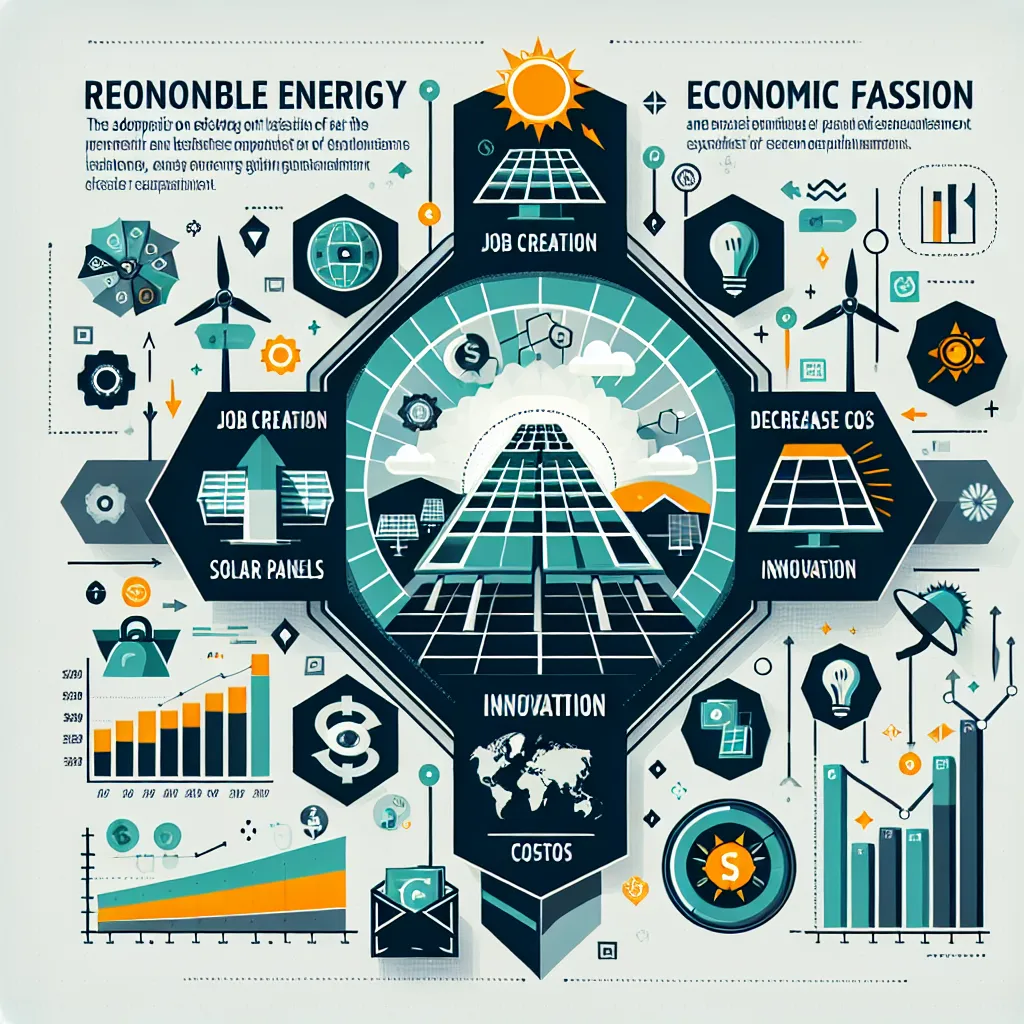Renewable energy and economic growth have become increasingly interconnected topics in recent years, frequently appearing in IELTS Writing Task 2 questions. This trend is likely to continue as global concerns about climate change and sustainable development grow. Based on past exam patterns and current global issues, we can expect to see more questions exploring the relationship between renewable energy adoption and economic prosperity.
Let’s examine a sample question that reflects this important theme:
Some people believe that the widespread adoption of renewable energy sources will lead to significant economic growth. To what extent do you agree or disagree with this statement?
Analyzing the Question
This question requires candidates to consider the potential economic impacts of transitioning to renewable energy sources on a large scale. Key points to address include:
- The relationship between renewable energy and economic growth
- Potential benefits and challenges of widespread renewable energy adoption
- Short-term vs. long-term economic effects
- Examples or evidence to support your argument
Sample Essay
Here’s a model answer that addresses the question effectively:
In recent years, the shift towards renewable energy has gained momentum globally, with many arguing that this transition will drive substantial economic growth. I strongly agree with this viewpoint, as the widespread adoption of renewable energy sources has the potential to create new industries, reduce energy costs, and stimulate innovation, all of which contribute to economic prosperity.
Firstly, the renewable energy sector itself is a significant source of job creation and economic activity. As countries invest in solar, wind, and other clean energy technologies, they create a demand for skilled workers in manufacturing, installation, and maintenance. For instance, the International Renewable Energy Agency reports that the renewable energy sector employed 11.5 million people worldwide in 2019, a number that continues to grow. This expansion not only reduces unemployment but also stimulates local economies and contributes to overall economic growth.
Moreover, the adoption of renewable energy can lead to reduced energy costs in the long term, benefiting both businesses and consumers. While initial investment in renewable infrastructure may be high, the operational costs are generally lower than those of fossil fuels. As technology improves and economies of scale are achieved, the cost of renewable energy continues to decline. This cost reduction can increase the competitiveness of businesses, particularly in energy-intensive industries, leading to increased productivity and economic output.
Furthermore, the transition to renewable energy drives innovation and technological advancement. As countries and companies invest in research and development to improve renewable technologies, they create new intellectual property and develop expertise that can be exported globally. This innovation spills over into other sectors, fostering a culture of creativity and problem-solving that is crucial for long-term economic growth. For example, advancements in energy storage technologies for renewable sources have applications in electric vehicles and consumer electronics, creating new market opportunities.
However, it is important to acknowledge that the transition to renewable energy may present short-term economic challenges. Some traditional energy sector jobs may be lost, and there may be initial costs associated with updating infrastructure. Nevertheless, the long-term economic benefits of renewable energy adoption far outweigh these short-term obstacles.
In conclusion, the widespread adoption of renewable energy sources has the potential to drive significant economic growth through job creation, cost reduction, and innovation. While there may be some initial hurdles to overcome, the long-term economic prospects of embracing renewable energy are overwhelmingly positive. Governments and businesses should, therefore, prioritize investments in renewable energy to secure sustainable economic growth for the future.
(Word count: 398)

Writing Tips for This Topic
When addressing topics related to renewable energy and economic growth, consider the following:
-
Use specific examples: Incorporate real-world examples of countries or regions that have successfully leveraged renewable energy for economic growth.
-
Balance your argument: While the question asks for your opinion, it’s important to acknowledge potential counterarguments or challenges.
-
Use appropriate terminology: Familiarize yourself with key terms related to renewable energy and economics to demonstrate your knowledge.
-
Structure your essay clearly: Use clear topic sentences and ensure each paragraph focuses on a distinct point.
-
Link ideas coherently: Use transitional phrases to connect your paragraphs and ideas smoothly.
Key Vocabulary to Remember
Here are some essential vocabulary items for this topic:
- Renewable energy (noun) /rɪˈnjuːəbəl ˈenədʒi/ – Energy from a source that is not depleted when used
- Economic growth (noun phrase) /ˌiːkəˈnɒmɪk ˈɡrəʊθ/ – An increase in the amount of goods and services produced per head of the population over a period of time
- Sustainable development (noun phrase) /səˈsteɪnəbəl dɪˈveləpmənt/ – Economic development that is conducted without depletion of natural resources
- Infrastructure (noun) /ˈɪnfrəstrʌktʃə(r)/ – The basic physical and organizational structures and facilities needed for the operation of a society or enterprise
- Innovation (noun) /ˌɪnəˈveɪʃn/ – The action or process of innovating; a new method, idea, product, etc.
- Competitiveness (noun) /kəmˈpetətɪvnəs/ – The quality of being as good as or better than others of a comparable nature
- Transition (noun) /trænˈzɪʃn/ – The process or a period of changing from one state or condition to another
- Job creation (noun phrase) /dʒɒb kriˈeɪʃn/ – The process of providing new jobs, especially in areas where there are few opportunities
Conclusion
The relationship between renewable energy and economic growth is a crucial topic in contemporary discussions about sustainable development. As you prepare for your IELTS Writing Task 2, remember to consider various aspects of this relationship, including job creation, cost reduction, innovation, and long-term sustainability. Practice writing essays on related topics, such as government policies to promote renewable energy, the role of technology in advancing clean energy solutions, or the challenges of transitioning to a green economy. By mastering this subject, you’ll be well-prepared to tackle a wide range of questions on sustainability and economic development in your IELTS exam.
For more insights on related topics, you might find these articles helpful: